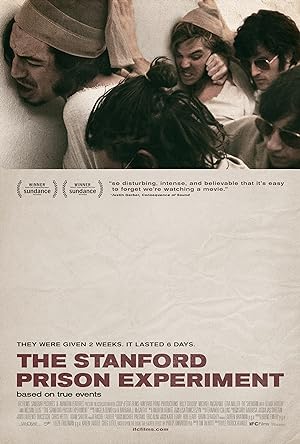Anyone with passing knowledge of Lord of the Flies will not be surprised to know that things can devolve quickly among even the most “civilized” group of people. I also heard a TED Talk by Dr. Philip Zimbardo so I already knew what to expect from The Stanford Prison Experiment movie, a dramatization of real events, and plan to read Dr. Zimbardo’s book, The Lucifer Effect. The Stanford Prison Experiment shows that unchecked authority can be arbitrary and dehumanizing regardless of who exercises it, especially if we create a system where people must obey authority or have basic rights removed (sleep, physical safety, clothes, food, freedom). What is interesting about the events of The Stanford Prison Experiment is that the forms of abuse wielded by the authority are timeless.
Even though I was very familiar with the movie’s subject matter, I still found The Stanford Prison Experiment compelling for two reasons. First, it is one thing to hear how quickly things devolved. It is another thing altogether to see it. When the intertitle shows that only one day has passed, but it felt much longer, then theory becomes reality.
Second, when the real Dr. Zimbardo tells the story, he is still engaging and charming because we’re not seeing him in the middle of events as they are unfolding, but The Stanford Prison Experiment illustrates-albeit some events were dramatized-how quickly a dispassionate academic study becomes a part of the exploitive power structure it seeks to examine. Dr. Zimbardo is the authority; thus he is responsible for what happens. The Stanford Prison Experiment condemns him. We expect the worst from young adult males even if they are intellectual counter-culture hippies, but a professional should know better.
I think that The Stanford Prison Experiment should be required viewing for anyone who doubts that any branch of law enforcement, though staffed by people that we love, know and trust, can still be at risk for such abuses. If you watch The Stanford Prison Experiment and the video of Sandra Bland being arrested, it will be easy to spot how discretion in enforcement can lead to abuse. Even if not extinguishing a cigarette was a violation of a lawful order, which it was not, imagine how many more arbitrary, demeaning and deindividualizing events unfolded away from the camera’s gaze which either literally led to her being murdered or made them responsible for her suicide. And why? Because Bland wasn’t deferential and expressed her displeasure at being pulled over, which is not against the law. The Stanford Prison Experiment shows that natural human feelings, thoughts and words can become criminal in the eyes of any human being seeking control and trying to assert dominance. Even subservience can be seen as a challenge in the wrong situation.
I plan to read the book because there are a lot of unanswered questions. Did the participants know each other before the experiment? Did they hang out afterwards regardless of whether they were a prisoner or not? At the end of the film, it says that the researchers found that the participants had no long-term negative effects of abuse. Bwahahahahaha. Yeah, right! BIf there were long-term effects, the researchers would become liable. Was there any independent verification of this finding?
I know that some women may take particular pride that a woman finally sounded the alarm, but I would not generalize that means women are less susceptible to inflicting abuse. There were plenty of female guards at concentration camps during World War II. Elizabeth Smart and Jaycee Dugard could testify to the lack of sensitivity or concern of their female captors. Perhaps if Dr. Christina Maslach was there at the beginning of the experiment, or if a different female psychologist had participated, the experiment would have gone on longer. We’ll never know, but I would not infer something positive from Dr. Maslach’s actions.
For those who complain that The Stanford Prison Experiment is a rip off of a German film called Das Experiment and an American remake called, The Experiment, those films were probably inspired by the actual Stanford Prison Experiment so hush. I know that there is actual footage from the experiment and a documentary called Quiet Rage: The Stanford Prison Experiment, but alas, I have not located either YET.
The Stanford Prison Experiment is must see viewing though it will be excruciating to watch and feel longer than it actually is. The Stanford Prison Experiment is a cautionary tale against the sadistic beast that lurks inside all of us and a helpful reminder that even if we don’t have power over the authority, we should always challenge that authority by pointing out when the authority is wrong.
Stay In The Know
Join my mailing list to get updates about recent reviews, upcoming speaking engagements, and film news.





